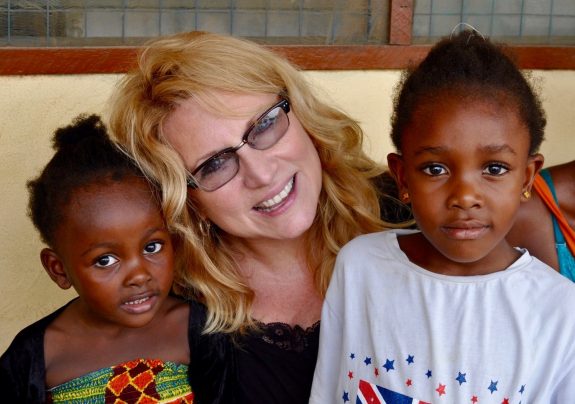We’re inviting you to help raise funds for a number of charitable causes this year. From July 1 to 31, we’ll be publishing posts on our Facebook page that you can like, share, and comment, with each of these actions resulting in a donation to a partner charity organization.

In this Q&A post, we’ll be getting to know one of our charity partners, Point Hope and its founder, Delilah.
Could you tell us more about your charity and its advocacy?
Point Hope believes all children deserve a safe, happy life. We have done a lot of work with refugee and impoverished children in West Africa and we continue to support that mission. Our goal is to be the “Voice for Forgotten Children” which includes the 463,000 American children in foster care here in the United States. Delilah, the founder of Point Hope, in addition to her adopted children from Africa, has adopted three children out of the foster care system in the U.S. and they have a forever home, a forever family, with her.
What inspired the charity, and how did it all begin?
Popular radio personality and Point Hope Founder, Delilah, was hosting her nightly program in 2003 when she received an email written by a single woman in West Africa, Winifred Ticley. Winifred wrote to Delilah from an internet café located outside a refugee camp run by the UNHCR in Ghana. Delilah read the appeal – Winifred was asking for help caring for her three starving children. They lived in a mud hut in a camp called Buduburam where over 80,000 refugees from Liberia and Ivory Coast lived in complete destitution.
Delilah felt God telling her she had to check out this story. She reached out to the people at World Vision, and learned the truth of Budubram. The United Nations had sponsored a refugee camp, primarily filled with Liberians, since the first civil war broke out in Liberia in 1990. Over the years the population swelled to over 80,000, in a camp that was equipped for 4,000. Instead of three little children who were starving and needing help, there were more than 30,000 children living without hope. This marked the beginning of Delilah’s founding of Point Hope.
In what ways does Point Hope give back to the community?
Point Hope has a number of programs that provides care for youth of various ages in the U.S.:
- Teenista: The Annual Point Hope Teenista allows foster girls between the ages of 13 to 18 to have a day filled with the fun of being pampered while also being mentored and encouraged.
- Beanies 4 Babies: Something as simple as a “beanie”, a tiny hand-made hat, can help to save the life of a premature child in a developing country. To date, over 1,200 beanies have been crafted and donated to Point Hope for distribution to underserved hospitals and clinics.
- Points of Hope: Points of Hope chapters exist to raise awareness and funding for Point Hope and to give caring, compassionate people of action the opportunity to reach out and offer Hope in their local communities. Many are making backpacks for kids to take with them when they go to new foster homes, so the kids can have something of their very own to take with them.
Point Hope helps in Africa in a number of ways:
- Agriculture: Point Hope’s agricultural program has been in place since 2004. Point Hope teaches and practices organic, sustainable gardening. The agriculture program provides skills training in vegetable farming, livestock and poultry. Parents or caregivers of malnourished children are encouraged to participate in the farming projects and are trained regarding vegetables, fruit, poultry and egg production. In this way, Point Hope is not just feeding a hungry child, it is empowering the family to care for the child as they grow.
- Nutrition: When Point Hope first started working in the refugee camp, almost half of the children living in the region suffered from malnutrition. Adam Sandow, along with the entire Point Hope team, has spent over 10 years working daily to improve the lives of those who are hungry. Adam’s education in public health and nutrition combined with his incredible heart for those who are suffering has changed and saved the lives of thousands. To date, Point Hope has not lost a single child enrolled in its program to malnourishment.
What challenges did your organization face, and how did you overcome them?
Point Hope’s biggest challenge and biggest success to date has been getting fresh water into the Buduburam camp, taking four years and considerable funding to complete. Finally, in May of 2008, clean and fresh water started flowing into the project site. Where initially there were only three “fetching stations”, there are now 19 to date. (A “fetching station” is comprised of double-sided spigots, much like we would see outside in our gardens in America.) Point Hope made 38 of these spigots available for 124 acres and 24,000 people – a vast improvement from the previous 18 years where these water sources were scarce or lacking.
Balsam Hill is now on its fourth year of giving back to the community through A Charitable Christmas in July. This year’s charity partners include the Alzheimer’s Association of Greater Idaho, Second Harvest Food Bank of East Central Indiana, Ronald McDonald House and Point Hope.






